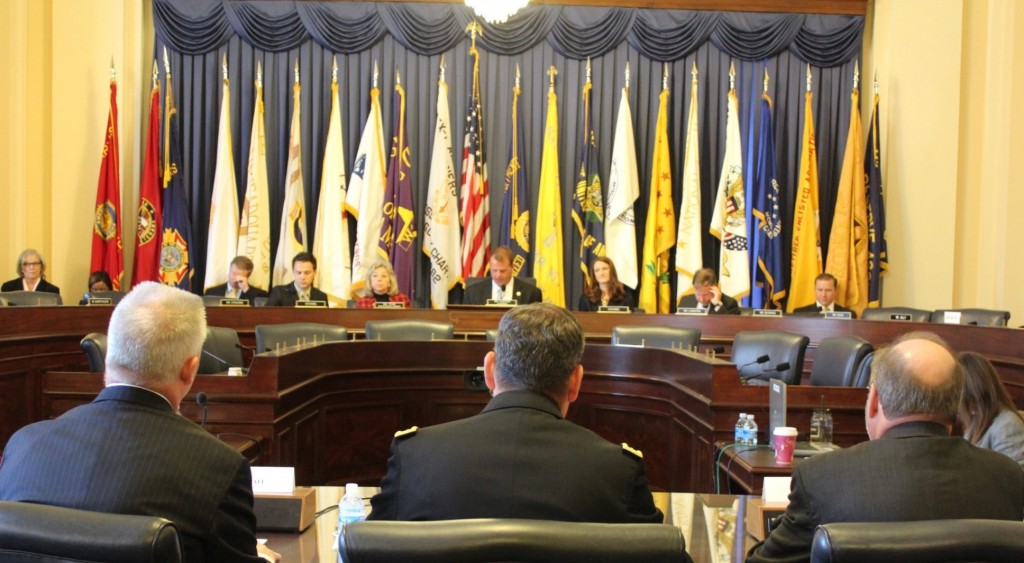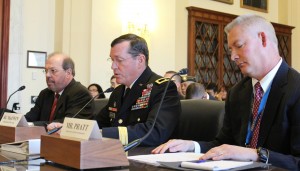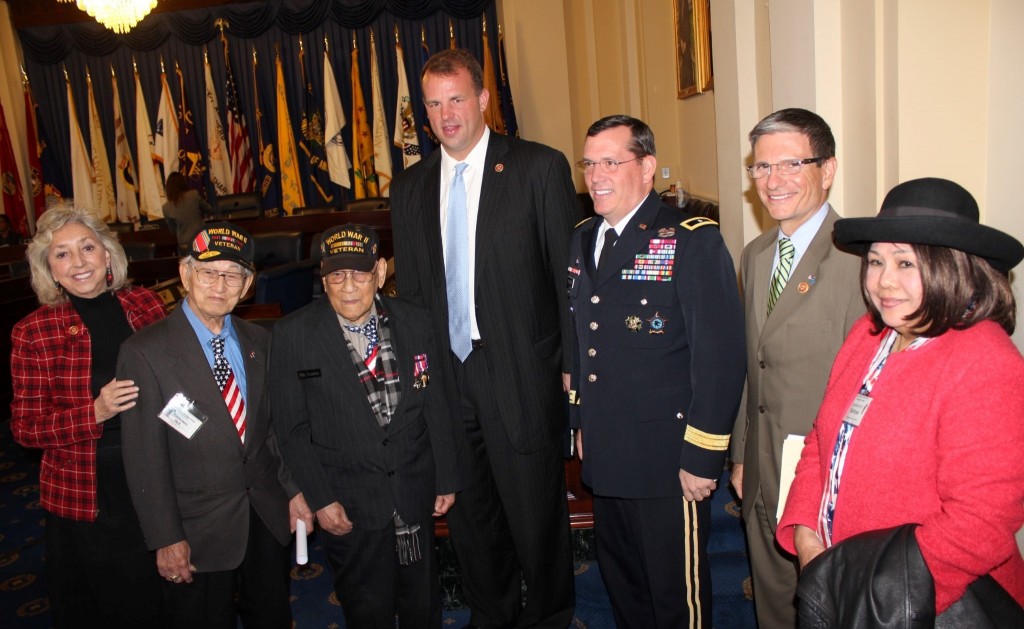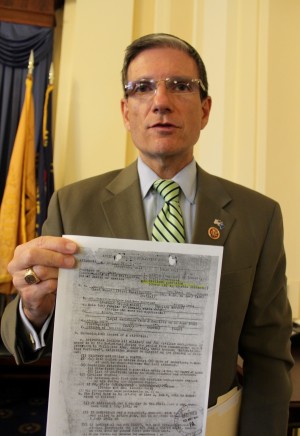US House continues inquiry into Filipino WWII veterans’ claims

The House Veterans Affairs Subcommittee on Disability Assistance and Memorial Affairs listens to witnesses from the Dept. of the Army, Dept. of Veterans Affairs, and the National Archives and Records Administration.
PHOTOS BY JON MELEGRITO
Supportive solons, advocates seek reconsideration of denied claims
4,500 benefits claims denied for bureaucratic reasons

From left, VA Senior Advisor Brad Flohr, US Army Brig.
Gen. David MacEwen and NPRC Asst. Director Keven Pratt Testify before a House Veterans Affairs subcommittee.
WASHINGTON, DC — Filipino World War II veteran Celestino Almeda, who turns 98 in June, is hoping Congress will act soon to help restore benefits he believes he rightly deserves. That’s why he attended a House subcommittee on veterans’ affairs here Thursday, November 20.
Almeda is one of more than 4,500 Filipino veterans whose claims have been denied under the Filipino Veterans Equity Compensation (FVEC) Fund – a program approved by Congress in 2009.
They have since appealed to the US Veterans Administration, claiming that it erred in disqualifying them from receiving equity compensation benefits. Among their demands: allow veterans to submit other forms of documents proving their wartime service.
Article continues after this advertisementResponding to concerns from Filipino veterans advocacy groups that the large number of pending claims points to a problem in the eligibility verification process, a House Veterans Affairs subcommittee grilled representatives from the Department of the Army, Department of Veterans Affairs (VA), and National Archives and Records Administration (NARA) at an oversight hearing on November 20.
Article continues after this advertisementWanted: Fair certification
“We want the system of certifying who is eligible to receive these benefits to be fair and transparent,” said Rep. Dina Titus, ranking member of the House Veterans Affairs Subcommittee on Disability Assistance and Memorial Affairs. “Time is of the essence. We are talking of veterans who are in their 90s. We must do right by them before they pass on.”
A similar hearing was held earlier in the year when US Rep. Joe Heck, chairman of the House Armed Services Oversight and Investigations Subcommittee, also questioned witnesses from the Army, VA and NARA.
The Republican congressman represents a district in Nevada with a large Filipino American population. Since coming to Congress in 2011, he has twice introduced legislation to “direct the Secretary of Veterans Affairs to accept certain documents as proof of service in determining the eligibility of an individual to receive amounts from the Filipino Veterans Equity Compensation Fund.”
In May 2013, US Sen. Dean Heller (R-Nevada) and US Rep. Colleen Hanabusa (Hawaii-01) introduced the Filipino Veterans Promise Act. It was meant to “establish a process for Filipinos who fought alongside the US military during World War II to document their heroic service so they can receive the benefits they earned and deserve.”
Hanabusa explained that “this bipartisan bill gives Filipino veterans the opportunity to verify their service with military historians in order to receive the benefits they fought for. It also calls for complete examinations of their records, while providing proper oversight to the process.”
Congress has yet to act on legislation that veterans’ advocates hope will correct the verification process and ensure that eligible veterans are not left out.
‘Qualifying Service’
In the meantime, oversight committees continue to examine the process for verifying eligibility, which the US Army instituted after the War. Thursday’s inquiry focused on the Filipino Veterans Equity Compensation (FVEC) Fund and the “Adequacy of Process in Verifying Eligibility.”
Testifying for the VA, Brad Flohr, senior advisor for compensation service, reviewed the provisions of FVEC, which authorizes a one-time payment of $15,000 for qualified U.S. citizens and $9,000 for qualified non-U.S. citizens.
He reported that of the 42,755 claims received as of October 2014, some 18,929 applicants were granted FVEC payments. Nearly 24,000 were denied because these claimants have no record of “qualifying service” in the Philippine Commonwealth Army, including recognized guerrillas, or in the New Philippine Scouts, he added.
Flohr also noted that in October 2012, the White House Initiative on Asian Americans and Pacific Islanders, created the FVEC Interagency Working Group (IWG) “to address the concerns of Filipino veterans who believe that their claims were improperly denied, or that they did not receive a satisfactory explanation as to why their claims were denied.” IWG’s goal was to increase transparency and accelerate processing of claims.
In compliance, “we have decreased the response time for service determination requests to 10 days or less,” said Kevin Pratt, a witness representing NARA.
“We maintain all the military personnel, medical and organizational records of each military service department. Included in the NPRC’s holdings are claim folders pertaining to Filipino nationals that were adjudicated by the U.S. Army after World War II, and unit rosters created by the U.S. Army in conjunction with its post-war recognition program.”
Assured cooperation
Pratt, who is assistant director for Military Records at the National Personnel Records Center (NPRC), assured the subcommittee of the agency’s cooperation “to ensure Filipino veterans, including those who served in recognized guerilla units, are recognized for their extraordinary in support of the United States during World War II.”
Speaking for the US Army, Brig. Gen. David K. MacEwen defended the Army’s “specific criteria and threshold for what we would consider as service. While many Filipinos feel that they served, they did not meet or reach the threshold for service. Second guessing what is already in the record is in the record is neither reasonable nor feasible.”

After the hearing Filipino World War II Veterans Potenciano Dy and Celestino Almeda (third from left) pose for a photo with, from left, U.S. Rep. Dina Titus, U.S. Rep Jon Runyon, Brig. Gen. David MacEwan, U.S. Rep. Joe Heck and FilAm community supporter Georgette Beltran of Gaithersburg, Maryland.
During the question and answer that followed, Rep. Heck, who was invited to the hearing, asked the panel if AGO Form 23 (Affidavit for Philippine Army Personnel, issued by the Adjutant General) would be acceptable as additional evidence for those claiming guerilla service.
He pulled out a copy and pointed out that Filipino veterans from his district presented this form in their appeals. “Three of them are more than a hundred years old, and two died recently,” he said. “Why isn’t this acceptable so you can expedite their appeals?”
In the inquiry he conducted in June, Heck, talked about the plight of “The Mighty Five,” a group of Filipino American veterans who reside in Las Vegas and have been denied full recognition of their service.
“I want to see denied Filipino veterans live out their days knowing their service did not go unrecognized and their sacrifices were not made in vain,” Heck said. “Many more will pass without ever obtaining the recognition they deserved, if this body does not act to remove the barriers preventing these veterans from receiving the benefits they have earned.”
The response from the U.S. Army was basically a reiteration of what MacEwan said earlier: that the specific criteria of determining eligibility cannot be changed.
Bureaucratic roadblocks
Almeda and the more than 4,500 Filipino Veterans waiting for recognition are hoping Congress will do something to correct a flawed process and allow veterans to present additional evidence and proof of service. “All we want is fair treatment,” Almeda told the witnesses at the conclusion of the hearing.
David Boelzner, a Washington lawyer who represented more than a dozen Filipino veterans in their appeals, said before the hearing that an act of Congress may be the only way “to remove bureaucratic roadblocks that continue to prevent many veterans from collecting the benefits they are due. It’s like a game of ping-pong between the VA and the Army. Too much passing the buck. In the meantime, they are dragging their feet while these aging veterans are dying.”
Eric Lachica, executive director of the American Coalition for Filipino Veterans (ACFV) notes that more than $56,000,000 in compensation benefits are at stake for the 4,500 elderly Filipino veterans and widows who have appealed the denials by the VA Dept. “We must continue to challenge US Army and VA officials on why they have not complied with recent laws and court decisions and to continue to deny these Filipino veterans official recognition today.”
Favorable court decision
Lachica was referring to a recent court decision by the United States Court of Appeals for Veterans Claims, which favored a Filipino veteran’s appeal after his claim was denied.
“Former VA Secretary Shinseki erred and should have followed the congressional directive of the FVEC law and the FY 2014 Appropriations Act that directed the VA to consider all forms of evidence of service and not just those originally considered,” Lachica said in his written statement submitted for the record.
Maj. Gen. Antonio Taguba (Ret) also hailed the recent court decision. He is spearheading the Filipino Veterans Recognition and Education Project (FilVetREP).
“This is another positive step forward for the veterans to gain their much deserved due process given the ambiguous nature on how the Army, NPRC, VA and VA Board of Appeals determine their decision making process to grant service verification and approval,” Taguba said.
“We must inform veterans with pending appeals, as well congressional supporters who are fighting with us to ensure that our veterans are recognized for their sacrifice and service to this country.”
In addition to securing a Congressional Gold Medal Award for Filipino World War 11 veterans, FilVetREP is also launching a nationwide campaign to educate the American public about the Filipino soldiers’ wartime service and their overall contributions to the US
RELATED STORIES
Senate committee OKs bill to help vets who were denied benefits
US willing to review Filipino veterans’ denied claims
U.S. senate leader will appeal to Obama for Filipino WWII vets
